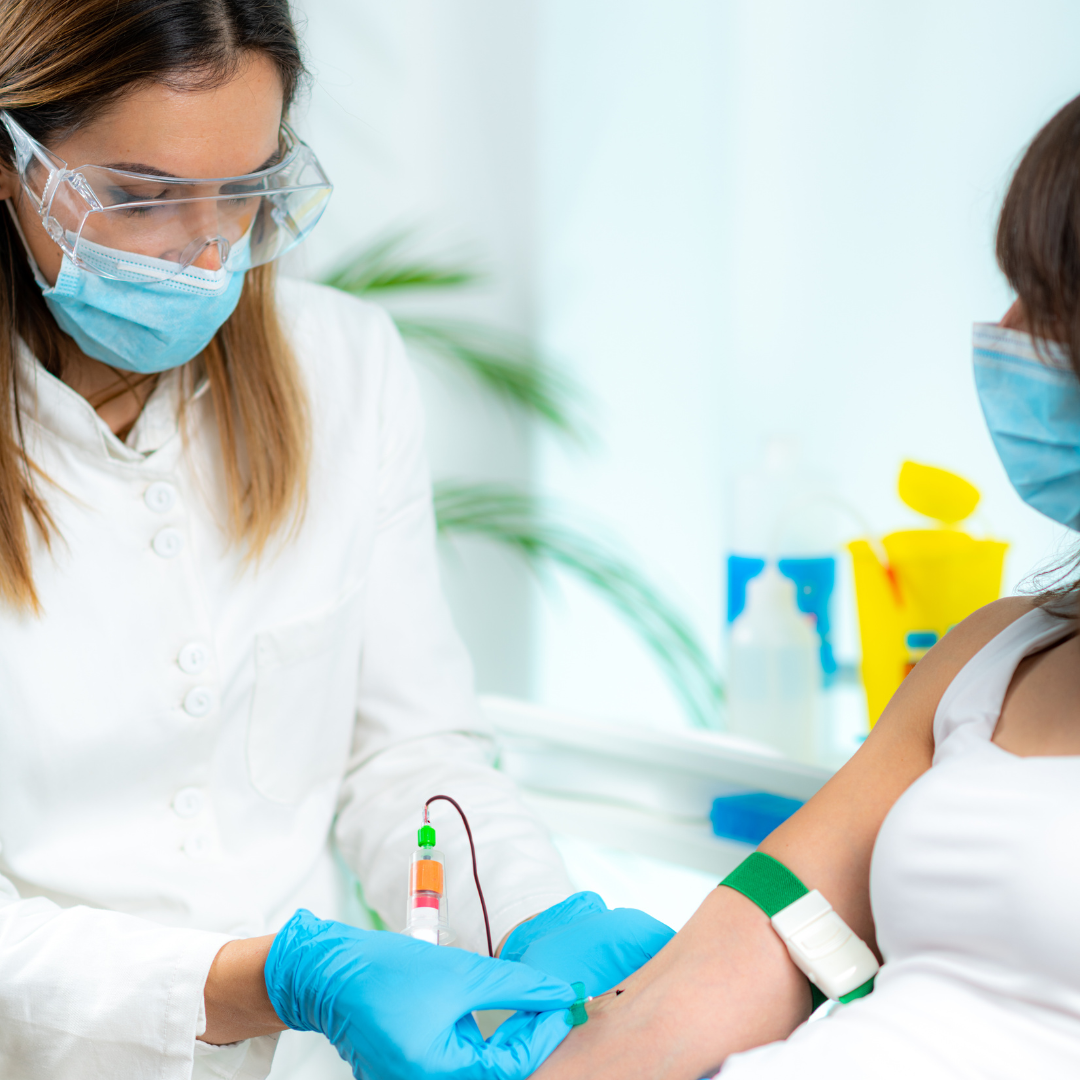
 PHLEBOTOMIST: A phlebotomist is trained to perform blood draws on children and adults. They collect and prepare blood for testing so it can be analyzed in a medical laboratory. They also collect blood for donation and can perform blood transfusions. Blood samples are collected through venipuncture (a puncture to your vein), finger pricks, or heel pricks, which are specifically for children. A forensic phlebotomist collects evidence samples of blood from crime scenes to help law enforcement in their investigations.
PHLEBOTOMIST: A phlebotomist is trained to perform blood draws on children and adults. They collect and prepare blood for testing so it can be analyzed in a medical laboratory. They also collect blood for donation and can perform blood transfusions. Blood samples are collected through venipuncture (a puncture to your vein), finger pricks, or heel pricks, which are specifically for children. A forensic phlebotomist collects evidence samples of blood from crime scenes to help law enforcement in their investigations.
Have you considered?
PATHOLOGIST: A pathologist is a physician (with an M.D. or D.O. medical degree) who leads the examination of the tissue and organ samples and coordinates or communicates with the primary care physician to ultimately determine a diagnosis of disease or cause of death. Pathologists work in labs, hospitals,s or morgues and help confirm disease diagnoses and causes of illness or death. There are many kinds of pathologists. There are forensic pathologists, dermatopathologists, and pathologists that specialize in blood analysis and other subspecialties.
MEDICAL TECHNOLOGIST: Also known as Clinical Laboratory Scientists (CLS), medical technologists operate complex electronic equipment, computers, and precision instruments. medical technologists analyze specimens of human blood and tissue under a microscope to look for bacteria, parasites, cancerous cells, or other microorganisms. They match blood for transfusions and check blood levels for chemicals, drugs, or other factors. Additionally, medical technologists evaluate test results, develop and modify procedures, and establish and monitor programs, to ensure the accuracy of tests.
MEDICAL LAB TECHNOLOGIST: Medical laboratory technicians, also called clinical laboratory technicians, perform routine laboratory procedures on blood, tissue, and other bodily fluids using instruments such as microscopes, chemicals, computers, and complex laboratory equipment. This career path requires patience and precision and the ability to work well under pressure.

Phlebotomy is one of the easiest ways to enter the medical field. Phlebotomists must have a high school diploma, a basic life support certification, and complete a phlebotomy technician training program. These programs can often be completed in as little as 2 months to one year. Students in training will draw blood from classmates and volunteers to gain experience.
Becoming a pathologist entails one of the lengthiest education and training tracks of all physicians. Requirements include four years of undergraduate study, plus four years of medical school, plus a minimum of four to five years of post-graduate training in a pathology residency. Pathology may be a career for you if you enjoy anatomy and physiology, you prefer to work in a lab behind a microscope, rather than interfacing with patients all day, you enjoy solving mysteries or finding answers to the unknown and you are drawn to scientific, analytical, and technical investigations.
A medical technologist career requires at least a bachelor’s degree, preferably in a scientific field. Additionally, the completion of an accredited medical technologist program is also required. The program must be accredited by the National Accrediting Agency of Clinical Laboratory Science. For optimum success, medical technologists should become certified in their field after completing all of the educational and training requirements. The ASCP offers a national certification exam that should be renewed every three years. This certifies that you are proficient in your field and allows you to use the initials MT(ASCP) after your name.
Students entering a medical laboratory technician program should have a high school diploma or equivalent. Individuals must complete an Associate Degree program in medical laboratory technology that includes clinical training. After completing this program, candidates must pass a national certification examination.
Utah Earning Potential Averages For Phlebotomists: (Jobs.Utah.Gov)
|
Annual Total Openings: |
70 |
|---|---|
|
Annual Growth Rate: |
7.1% |
|
Median Annual Wage: |
$30,910 |
|
Education: |
Post Secondary Certificate |
US Earning Potential Averages For Pathologists: (Jobs.Utah.Gov)
|
Annual Total Openings: |
471 |
|---|---|
|
Annual Growth Rate: |
9.2% |
|
Median Annual Wage: |
$267,180 |
|
Education: |
Doctoral/Professional Degree |
US Earning Potential Averages For Clinical Lab Technologists: (Jobs.Utah.Gov)
|
Annual Total Openings: |
21,800 |
|---|---|
|
Annual Growth Rate: |
7% |
|
Median Annual Wage: |
$57,800 |
|
Education: |
Bachelor's Degree |


